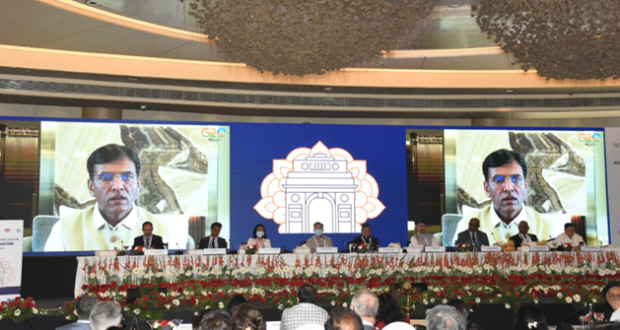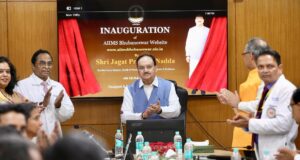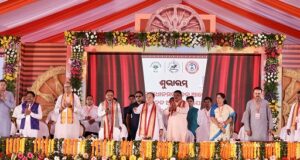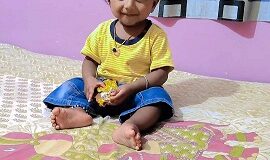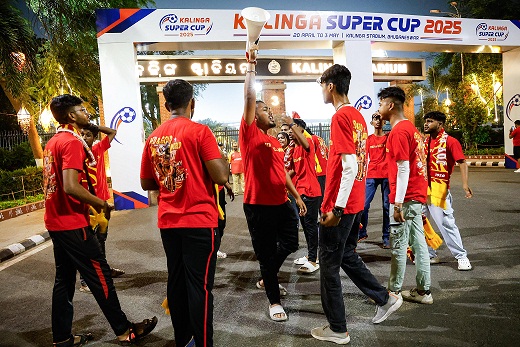Newdelhi:24/4/23:“Malaria is not just a public health issue but also social, economic and political challenge that requires the co-operation of all stakeholders. India was the only high-burden, high-impact country in South- East Asia region to report a decline in malaria cases in 2020 as compared to 2019. India witnessed 85.1% decline in malaria cases and 83.36% decline in deaths during 2015-2022”. This was stated by Dr. Mansukh Mandaviya, Union Minister for Health & Family Welfare as he virtually addressed the Asia Pacific Leaders’ Conclave on Malaria Elimination in presence of Dr. Manik Saha, Chief Minister of Tripura, Dr. R. Lalthamgliana, Minister, Health and Family Welfare Department, Mizoram, Dr. V.K Paul, Member (Health), NITI Aayog, and Dr Poonam Khetrepal, Regional Director, WHO-SEARO.
Dr. Culwick Togamana, Minister of Health and Medical Services, Solomon Islands, Dr. Antonio Lalabalavu, Minister of Health and Medical Services, Republic of Fiji, H.E. Prof. Dr. Dante Saksoni Harbuwono, Vice Minister of Health, Republic of Indonesia, Dr. Zaliha Binti Mustafa, Minister of Health, Malaysia, H.E. Dr. Mao Tan Eang, Under Secretary of State, Ministry of Health, Kingdom of Combodia, Dr. Champa Aluthweera, Director, Anti Malaria Campaign, Ministry of Health, Sri Lanka, Dr Chuman Lal Das, Director, Epidemiology and Disease Control Division, Ministry of Health, Nepal, Dr Moh Moh Lwin, National Director, Myanmar were also present at the conclave.
Lauding the vision of Hon’ble Prime Minister,Dr. Mandaviya elaborated that Shri Narendra Modi ji was among the global leaders who endorsed the malaria elimination roadmap of Asia-Pacific Leaders Alliance at the East Asia Summit in 2015 which galvanized the region in striving to become malaria free by 2030.
Dr V.K Paul congratulated South Asian and Pacific Region countries in achieving significant decline in malaria cases and stressed on the goal to make malaria a history with a focus on working on most marginalized and vulnerable communities with an inter-sectoral approach. He highlighted the need for collaboration across borders while embracing whole-of-government and the whole-of-society’s approach. “We can’t eliminate malaria till we work together across borders. We need to prioritize research & innovation, and encourage behavioral change research. We need to work tremendously in developing vaccine against malaria in order to have additional arms against Malaria.” Advocating leveraging the use of digital tools for eliminating malaria, Dr. Paul stated that “We need to focus on high-burden areas and eliminate this disease with inter-sectoral collaboration which starts at village level.” Dr. Paul emphasized that urban areas with dense population, migrant population, areas inhabited by tribal population are some key challenging areas where we need to focus and work together as ‘One Team India’.
Dr. Manik Saha, Chief Minister of Tripura alluded to the devastating effects endured by Tripura in 2014 due to an outbreak of malaria. He informed how the State evolved and scaled its practices of vector-control measures, community awareness via institutional support such as Indian Council of Medical Research leading to an all-round development of the state and sharp reduction of cases of malaria.
Dr. R. Lalthamgliana, Health Minister, Mizoram highlighted the role and impact of political commitment stating “these deliberations, discussions serve to enhance knowledge and awareness in this endeavour, and illuminate further ways and means of achieving higher impact.”
Dr Ratu Atonio Rabici Lalabalavu, Minister of Health and Medical Services, Fiji discussed the practices deployed to eliminate malaria from their country. He said “There is a need for contingent and persistent efforts as no-size-fits-all and all countries must leverage the available resources to the best of their use, strengthening community engagement and institutional mobilization.”
Dr. Culwick Togamana, Minister of Health and Medical Services, Solomon Islands referred to impediments of financial constraints. He advocated employing whole-of-government, whole-of-society approach with support from different organizations in the endeavour to eliminate malaria. He further added “that this is an occasion to review our progress, re-affirming our commitments and strategize plan to eliminate malaria by 2030.”
Reiterating the importance of regional and political commitment to strengthen inter-sectoral commitment with a whole of system approach, Shri Rajesh Bhushan emphasized that awareness, detection, diagnosis and treatment need to be taken to the door step of the last mile community for successful elimination of the disease.
Dr Poonam Khetrapal Singh added “Together, we must invest, innovate and implement, with a focus on reaching the most vulnerable first. Reaching these sections of the population is imperative for achieving the Global Technical Strategy and Sustainable Development Goal targets, and also for delivering on our promise of achieving zero malaria for everyone, everywhere in our region.”
Dr Sarthak Das, CEO, Asia Pacific Leaders Malaria Alliance and senior representatives from various government departments, development partners and corporates were present.
 Odisha news today, Latest Oriya News Bhubaneswar Online Odia news Portal
Odisha news today, Latest Oriya News Bhubaneswar Online Odia news Portal
